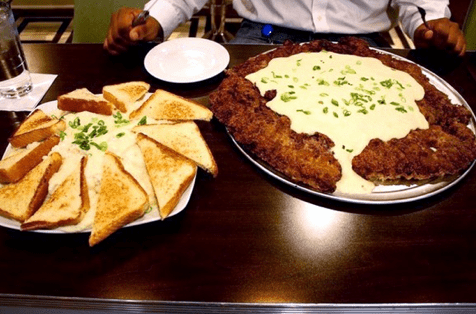
(Courtesy of slashfood.com)
An omelet composed of 12 eggs topped with beef brisket chili, salsa, sour cream and cheddar cheese is an infamous menu item at Beth’s Café in Seattle. This 5-pound omelet, presented in a pizza pan and served on top of a bed of hash browns and four pieces of toast, goes by the name of “Southwestern Exposure.”
SMU sophomore Clay Moore tried to eat the omelet as part of a food challenge when he was back home last summer.
“It was delicious for the first few bites, but then the pure amount of carbs gets to you. I was only able to get through three-fourths of it,” Moore said.
This omelet is only one of the many food challenges captivating society today. The motivation behind the increasing popularity of food challenges could be attributed to the prizes associated with winning, earning a free meal, or solely entertainment.
Even restaurants in Dallas like Frankie’s Bar and Grill and Cowtown Diner are beginning to follow this trend. But, this trend has some health experts concerned. In a nation battling obesity, the trend is sending a wrong message, they say.
“These challenges perpetuate America’s image of gluttony,” dietitian Holli Seethaler said.
The food challenge in which Moore participated, Beth’s Café’s “Southwestern Exposure,” was featured on the television show “Man v. Food” in 2009.
“Man v. Food” is a reality show on the Travel Channel hosted by actor and food enthusiast Adam Richman. In each episode, he investigates local restaurants in cities all over America and accepts unthinkable food challenges at each one.
“Although food challenges are fun to watch, it is extremely unhealthy. That’s part of the reason they created ‘Man v. Food Nation,’ because Adam Richmond hit an unhealthy point with his weight and cholesterol,” Sarah Wood, freshman at the University of Arkansas, said.
“Man v. Food Nation” was the final season of “Man v. Food” in which Richman recruited residents of the cities, instead of himself, to participate in the food challenges.
“I am not going to lie, I will watch an episode of ‘Man v. Food,’ but not with out gagging a couple of times,” SMU sophomore Claire Kelley said. “I could never do something like that, but I think it’s kind of fascinating in a gross, creepy kind of way.”
Such food challenges exist in cities all over the United States. Most challenges have some sort of prize incentive to generate appeal to customers.
Here in the Dallas area, more food challenges have surfaced in the restaurant industry recently.
The “Double Sumo Burger Challenge” at Frankie’s Bar and Grill on McKinney Avenue. consists of two 22-ounce beef patties, 8 ounces of cheese, lettuce and tomato served with 1 pound of French fries. This dish amounts to a whopping 5 pounds.
“For some people it’s fun to just have that one challenge in life, just to say you did. But, considering America is having an obesity epidemic, maybe the challenges should be limited or changed,” SMU sophomore Gina Haskins said.
Restaurants continuously reward their customers for finishing these enormous amounts of food. These rewards are negatively contributing to the growing food culture in America.
If you complete Frankie’s challenge in 30 minutes, your meal is free and you receive the following perks: a T-shirt, commemorative photo and your name on the wall. Complete this challenge in an hour and you receive the perks, but you must pay for your meal.
“Although food challenges are fun to watch, [they are] extremely unhealthy,” Wood said. “I think [they] definitely contribute to increasing obesity in the U.S.”
The “Full-O-Bull Platter” at Cowtown Diner in Fort Worth contains a 4-pound chicken fried steak, 10 slices of toast, 6 pounds of mashed potatoes and gravy. This meal is valued at $70 and 10,000 calories. If you can finish it, it is free; however, no one has been able to do so yet.
The “18-Slider Challenge” at Rooster’s Roadhouse in Denton is comprised of 18 barbeque sliders and 1 pound of cheese fries. Finish them in less than 30 minutes and your meal is free.
No matter where the challenge may be, the trend seems to flourish because of two things: competition and reward.
“I think challenges like these are definitely a pride thing. It has a competitive nature to it, and it’s a way for people to tell about their conquests,” Moore said.
The simple competitive nature in combination with the desire to win has resulted in this foodie phenomenon.
“Not to eat in moderation, but the most is the best. Looking at restaurant portions, 2-3 times a normal size or meal calorie requirement, super sizing meals, BIG Gulp sodas. I guess it is a fun thing for young people to do once to say they did it,” Seethaler said.
Taking these things a step further is The Heart Attack Grill. This American restaurant opened in Dallas in May 2011.
High-calorie menu items named after traumatic health conditions and waitresses’ nurse outfits helped shape the restaurant’s provocative, hospital theme.
Hamburgers ranging from 8 to 32 ounces of beef were called “Single,” “Double,” “Triple” and “Quadruple Bypass” burgers. These burgers are topped with unadulterated bacon slices and served with a side of “Flatliner Fries,” that are cooked in pure lard.
However, the reward at The Heart Attack Grill is unlike any other restaurant. Customers that weigh over 350 pounds are honored for their size and get to eat for free.
The fact that customers are being recognized for their unhealthy accomplishments speaks measures about the American society as a whole. Gluttony has never before shined in such a positive light.
After merely six months, Dallasites became conscious of the restaurant’s unhealthy impact, and The Heart Attack Grill closed in October 2011.
Kelley said, “I think it’s disgusting that people are forcing themselves to eat insane amounts of food, especially considering how severe obesity and its health risks have become in America.”









